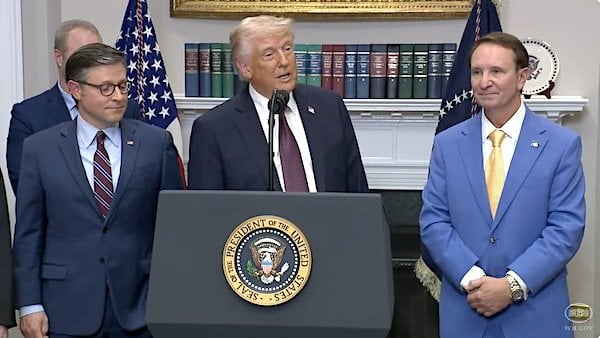President Donald J. Trump’s energy plans to promote oil and gas production can reset the world stage, and Louisiana Gov. Jeff Landry is on board. This month he signed into law a bill that prioritizes production of fossil fuels and nuclear power, rather than wind and solar power, in his state.
The new law, Act 462 (formerly HB 692), sponsored by Rep. Jacob Landry (no relation to Gov. Landry), requires the Louisiana Department of Energy and Natural Resources to focus on production of domestic fuel, rather than energy sources that rely on foreign countries for materials. The law extends the definition of green energy to nuclear power and natural gas.
This law is so obvious that it is surprising that it needs to be passed at all, especially in Louisiana, which has no requirement to produce electricity from wind and solar power. Rates, at 13 cents per kilowatt hour, are below the U.S. average, but they have risen steadily from 9 cents per kilowatt hour in 2020.
The top 10 states for residential electricity prices (except Alaska, which has few residents spread out over a large geographic area) all have requirements to use wind and solar power to generate electricity. They would do well to copy Louisiana’s new law. Their lower electricity prices would benefit their residents and attract additional manufacturing, generating increased employment.
This month’s Middle Eastern conflict between Israel and Iran shows the wisdom of President Trump’s energy dominance agenda. Energy dominance means producing enough oil and natural gas to replace OPEC countries as the global price setter. The price of oil went up from $65 to $75 a barrel, then back down to $65. No longer is the U.S. at the mercy of OPEC, as it was in the 1970s.
With a U.S. energy dominance agenda, no longer must the U.S.—or the world—depend on corrupt governments as sources of oil, gas, and critical minerals, or renewables and electric vehicles. This has vast geopolitical implications.
Lower U.S. electricity prices will reduce manufacturing costs in America, attracting foreign investment and creating jobs. In emerging economies, more support for fossil fueled power plants will lower energy prices.
The U.S. has approximately 1.7 trillion barrels of technically recoverable oil and over 4 quadrillion cubic feet of technically recoverable natural gas resources. Treasury Secretary Scott Bessent proposed increasing US production by 3 million barrels per year, potentially driving prices below $50 a barrel.
This represents a major change from the policies of President Joe Biden, who discouraged oil production by reducing federal land available for leases and banning offshore development. When he wanted additional oil in 2022, he asked Saudi Arabia and Venezuela to pump more.
With increased output, the North American energy platform, with its heavy crude from Canada and Mexico and its light crude and refineries in the U.S. will be able to set prices.
Sales of U.S. oil and natural gas give U.S. allies an alternative to Russian products and cut into Russian sales. Russian oil and natural gas revenues in 2024, the vast majority from oil, amounted to $120 billion, about 30 per cent of its total revenues, substantially lower than levels of 50 per cent between 2011 and 2014.
This will be even more important when fighting in Ukraine ends, with possible removal of Russian sanctions. President Trump would be able to pressure countries to use American oil rather than Russian oil, potentially using tariffs to encourage buyers.
President Trump is also taking on China, which controls 38 per cent of the reserves of global rare earth elements; 60 per cent of rare earth mining; 85 per cent of rare earth processing, and 90 per cent of rare earth permanent magnet manufacturing. This enables the production of 80 per cent of solar components, global battery production, and cobalt refining capacity.
Similarly, the new Louisiana law specifically calls for “minimizing reliance on foreign nations for critical materials or manufacturing by prioritizing infrastructure necessary to deliver energy to Louisiana customers.”
Cheaper energy caused by additional U.S. production and loans for fossil-fuel power plants would also benefit people in emerging economies, especially Africa and Latin America, without reliable electricity and cheap fuel. Lower oil prices empower countries with poor electricity distribution, lowering costs of diesel generators, used by businesses and households.
The federal government is shifting to energy dominance, but states can still stand in the way. Louisiana’s new law provides a model for other states to follow.
Diana Furchtgott-Roth, former Deputy Assistant Secretary for Research and Technology at the U.S. Department of Transportation, directs the Center for Energy, Climate, and Environment at The Heritage Foundation.
Click this link for the original source of this article.
Author: RealClearWire
This content is courtesy of, and owned and copyrighted by, https://www.wnd.com and its author. This content is made available by use of the public RSS feed offered by the host site and is used for educational purposes only. If you are the author or represent the host site and would like this content removed now and in the future, please contact USSANews.com using the email address in the Contact page found in the website menu.








